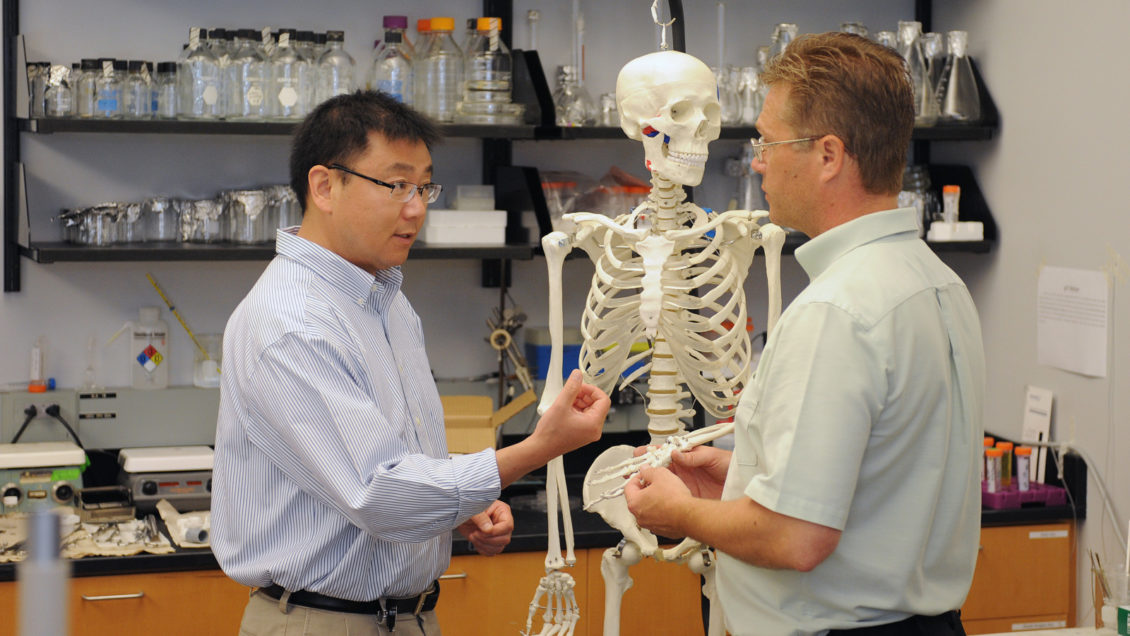Eight Clemson University faculty members have received grant funding from the newly formed South Carolina Center for Translational Research Improving Musculoskeletal Health (SC-TRIMH).
Led by bioengineers at Clemson, SC-TRIMH combines orthopedics and other clinical expertise from Prisma Health–Upstate (formerly Greenville Health System) and the Medical University of South Carolina with computer scientists, computational engineers, biophysicists and other experts to better understand musculoskeletal disorders and to design and evaluate new devices, interventions and drug therapies.
For the first year, the center has awarded $125,000 to help grow health-related research and extend the community of researchers investigating musculoskeletal projects, said Hai Yao, Ernest R. Norville Endowed Chair in Biomedical Engineering in Clemson’s bioengineering department and leader of SC-TRIMH.
“As a newly established musculoskeletal research center, we are working to grow this type of research community at Clemson through seed grant funding,” Yao said. “Our hope is to see these projects grow and mature through larger grant funding and to see this research positively impact our healthcare systems.”
Funding began in early April for three types of one-year grants: Fast Forward grants, Discovery grants, and Mentored Investigator grants.
Fast Forward grants generate critical preliminary data for a planned submission or resubmission of an extramural grant application within six months. The awardees of the $10,000 Fast Forward grants are:
- Susan Duckett, Ernest L. Corley Jr. Trustees Endowed Chair, animal and veterinary science department, for her project, “Identification of miRNA regulating skeletal muscle growth from before birth to maturity”
- Ann Foley, assistant professor, bioengineering department, for her project, “The Role of Kinase Signaling in Musculoskeletal Differentiation and Maintenance”
- Jiro Nagatomi, professor, bioengineering department, for his project, “Investigations of Effects of Hydrostatic Pressure on IVD Cells within 3D Biomimetic Scaffolds”
- Sara Sarasua, assistant professor, School of Nursing, for her project, “Translational Research on Adhesive Capsulitis: Etiology, Epidemiology and Comparative Effectiveness of Therapy”
- Joseph Singapogu, assistant professor, bioengineering department, for his project, “Simulator-based Assessment and Training of Arthroscopic Surgical Skills.”
The Discovery grant provides strategic support to explore the feasibility of projects that might become collaborative R01s, which are National Institute of Health Research Project Grants or center grants. The $25,000 Discovery grant was awarded to:
- Susan Chapman, associate professor in the biological sciences department, for her project, “Identify Candidate Triggers for Ankylosing Spondylitis.”
The Mentored Investigator grant provides mentored research experiences for junior investigators who may become candidates to replace current COBRE (Centers of Research Excellence) junior investigators. The $25,000 Mentored Investigator grant awardees are:
- Kara Powder, assistant professor, biological sciences department, for her project, “Developmental Origins of Sex-Specific Differences in Craniofacial Bone Shape”
- Yongren Wu, research assistant professor, bioengineering department, for his project, “Estrogen Effect on Beak Ligament Structure-Function Relationship in Thumb Basal Joint.”
Get in touch and we will connect you with the author or another expert.
Or email us at news@clemson.edu

